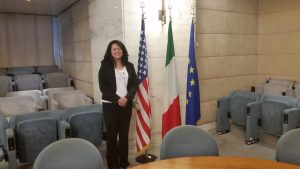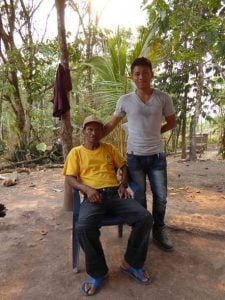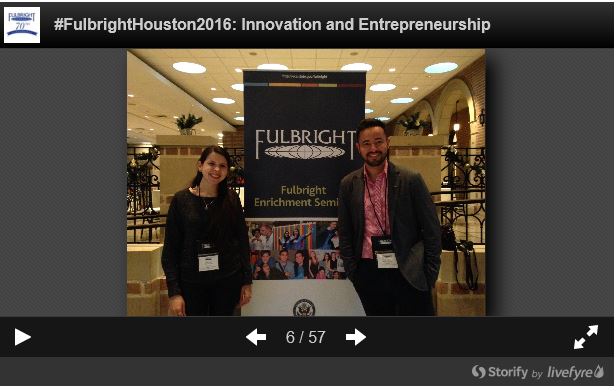
Sheila Xu, 2016-2017, Italy, attending her first visit at the Italian Ministry of Foreign Affairs for a Fulbright event
Italy is one of the top vacation destinations in the world. The whole country is an outdoor museum, steeped in ancient history and customs. The food and weather are world-renowned. Even spoken Italian has a musical rhythm to it. One would think moving to Italy would be la dolce vita, or “living the sweet life”.
However, living in Italy on a Fulbright grant as a deaf person (Cochlear Implant user with both oral and sign language skills) certainly has its own trials and tribulations. I came to discover that the experiences and perspectives of a typical deaf Italian and American are very different. One notable difference is our languages. In the United States, American Sign Language (ASL) is the language of deaf Americans. But almost nobody in Italy knew ASL! So, it was time for me to learn Italian Sign Language, or Lingua dei Segni Italiana (LIS), so I could communicate with deaf Italians. In fact, I am proud to say I am now able to give a presentation in LIS to an audience of LIS signers when giving seminars about the American Deaf culture and its people.

Alex Mercado, an English teacher, interviewed his grandfather, Rodolfo Aguilar, about fighting in the Nicaraguan civil war.
As a child growing up in California, I loved hearing my mother talk about Siuna, the small town in Nicaragua where she grew up. Chickens ran around in her family’s yard, and they drank milk fresh from the cow. And when it rained, she said, the streets glittered with gold pebbles.
Almost twenty years later, I found myself on a run-down porch in Siuna with an 82-year-old man. As a rooster crowed, he told me the same story.
I was on my Fulbright year, doing research for a novel about Siuna. Not only was it the fairy-tale place of my mother’s stories; from about 1900 until 1979, it was home to an important gold mine owned by Americans and Canadians—hence the legend about gold in the streets. Siuna was essentially a company town; the North American staff lived in a luxurious, fenced-in zone on a hill, and most of the locals were miners, mechanics, and office workers. Today, all that remains are a few ruins, the green-and-white company bungalows, and a polluted lagoon—the former open-pit mine—where prospectors still pan for gold.
From town elders I heard happy recollections of bygone days—a well-stocked commissary, company parties—as well as tragic stories of mining accidents and economic depression after the company left. In order to share my findings, I worked with Professor Luis Gonzalo Herrera Siles at the local university, URACCAN, on a course combining history, narrative, and English learning. Each student—nine English teachers, ranging from age 20 to 38, and two college students—was to research and produce a podcast in Spanish, then translate into English. One pair talked to former miners about life underground; another student interviewed his father, a farmer who’d been caught in the 1980s Contra war. Another spoke with his wheelchair-bound friend about the incident that had paralyzed him.

Zane Thimmesch-Gill, 2008-2009, Canada, visiting Glacier National Park
I’m excited to announce that my debut book, Hiding in Plain Sight, was just nominated for a Lambda Literary Award. It follows a homeless female-to-male trans kid as he struggles to survive on the streets. The book is an important resource for adults trying to understand the inner lives of at-risk children, and an inspiring story for vulnerable youth who dream of escaping poverty and violence. It’s also a plain ole exciting adventure story. The book is available through Amazon, Goodreads, Kobo, Smashwords, and iTunes.
And I couldn’t have written it without the invaluable experience of the Fulbright Program.
As a young adult, I lived on the streets. After years of struggling with extreme poverty and violence, I managed to get through college and graduate school. Although it might sound weird, once I escaped the streets, I started to miss them; no matter where you come from there’s something comforting in the known.
Five Tips for Fulbright Applicants and Grantees from a Fulbright Alumnus to Colombia
November 14, 2016
Nick Brown, 2015-2016, Fulbright English Teaching Assistant to Colombia
Are you considering applying to or have you recently been awarded a Fulbright grant? If so, this article is for you.
I just completed a year as a Fulbright English Teaching Assistant (ETA) in Colombia. Since the experience was the best year of my life, I want to share five tips to help you with your application and/or grant.
Tips one and two are for applicants while tips three through five are for current grantees, and may also be useful to Fulbright hopefuls.
Fulbright U.S. Student Alumna and Author Deanna Fei (2003-2004, China) Shares How Her Book Girl in Glass Evolved and Offers Advice for Prospective Applicants
November 11, 2016
Deanna Fei, 2003-2004, China
Can you tell us about Girl in Glass, and how that book came about?
GIRL IN GLASS is the story of my daughter’s birth, nearly four months premature–and how I learned to be the mother of a child I knew I could lose at any moment. The book also explores, in a larger societal context, what it means to sustain a life: from the front lines of neonatal intensive care units to the perils of the American health care system to the force of a child’s will to live.
For a long time, I was so steeped in the trauma surrounding my daughter’s arrival that I couldn’t imagine ever telling this story. Then, a year after I brought her home from the hospital, the CEO of my husband’s company publicly blamed her for being a drag on the bottom line and slapped a price tag on her life, setting off a national firestorm. It was only then, as the circumstances of her birth became the subject of countless headlines, that I realized I needed to speak out to defend the basic worth of her life.






